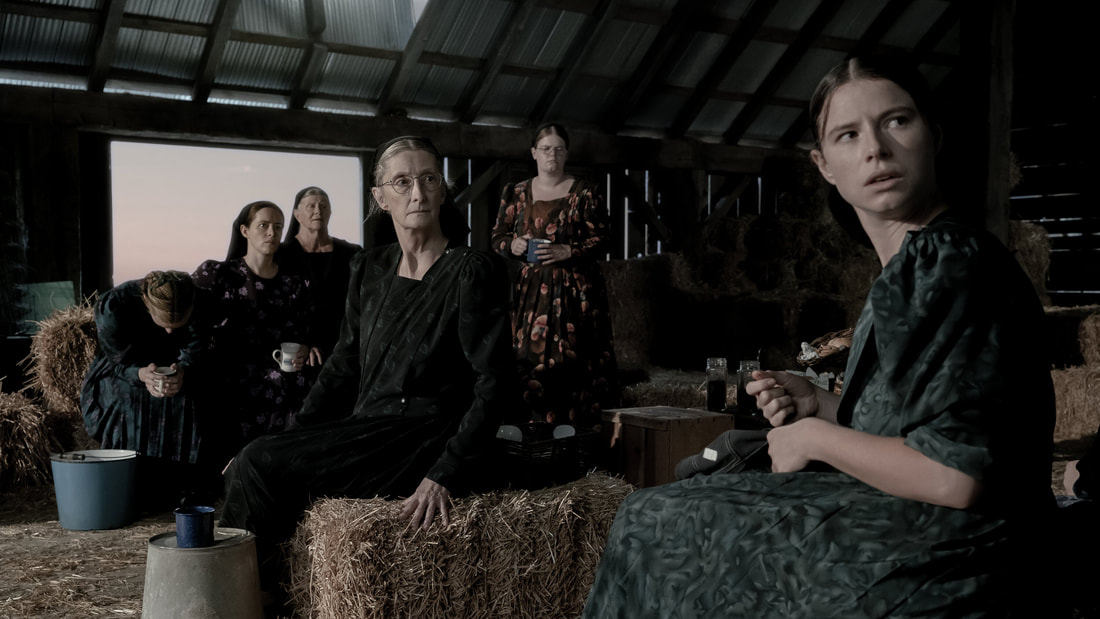|
Alexander Payne’s magnificent return to form, The Holdovers, begins with an aching song by Damien Jurado played over the wintry landscape of a New England boarding school. Payne might have plucked this song out of the film’s 1970’s setting, as it sounds like a lot of the melancholy folk from that era, but just like Payne and The Holdovers itself, Jurado is a contemporary artist bringing the tone of the past into a present that doesn’t have much patience for art that’s a little slow and a little atmospheric. By immediately letting the viewer know that his film is going to contain that and more, that it’s going to embody a setting and a time period, Payne gives them permission to let themselves get swept away in his best film since Election, a film as acerbic as The Holdovers is earnest.
0 Comments
American legal dramas are an instantly recognizable genre, from the cookie-cutter crime shows of Dick Wolf to John Grisham’s noble underdogs. Plain-speaking country lawyers butt up against slick guys in expensive suits, turning the trial into a contest of charisma more than anything related to the law itself. There’s a preening theatricality to most representations of the American court system that can provide opportunities for great/big acting, but the manipulation too often becomes apparent. Two French legal dramas in 2023 provided an antidote to the Few Good Men and Times To Kill of the world. Saint Omer and Anatomy of a Fall presented a vision of a legal system that didn’t need to pretend anyone was stupid, that took its time with the case and kept a low but focused volume. Both are intensely interested in the psychological state of the accused, spending far more time on that than any forensic pseudo-science. Anatomy of a Fall especially is just as, if not more, entertaining and compelling than a legal drama, or most any other genre of film. Whatever the mysterious mechanics of the French legal system, Justine Triet’s phenomenal work is bursting with ideas, making its American counterparts look tawdry and immature. It’s therefore a perfect French export.
My favorite Wes Anderson film, The Grand Budapest Hotel, takes its first several minutes to introduce a story within a story within a story. The center of this tangled device is where the vast majority of the film takes place, before unwinding in a brief epilogue back to where it started. Asteroid City, Anderson’s latest, does the same thing but in a much more intrusive way. The setting that formed the basis of Asteroid City’s marketing is a theatrical play, but the viewer also gets a reenactment of the production and the behind-the-scenes drama of the play. That none of this was tipped to the viewer before Asteroid City made its way to theaters is an off-putting move by the promotion department, but once settled in, the themes he’s trying to pull out of the most complicated structure he’s ever attempted begin to appear. Anderson’s intermittently successful in the least of his last four live-action releases, but then, Grand Budapest also was a grower for me. On the fourth or fifth rewatch, maybe Asteroid City will suddenly click into place.
Darren Aronofsky is a director who puts his actors through the physical and emotional wringer. Natalie Portman in Black Swan, Mickey Rourke in the Wrestler, Jennifer Lawrence in mother!, and the entire cast of Requiem for a Dream all went through it, and awards bodies that stereotypically give prizes for most acting as opposed to best acting ate it all up. The same applies to Aronofsky’s latest, The Whale, but what separates it from Aronofsky’s earlier work is a total lack of empathy for the lead character played by Brendan Fraser. A morbidly obese man in the final week of his life, Fraser’s Charlie moves between caricature and sap, like something out of a Jerry Lewis exploitation film so terrible that it’s been sealed away. I’ve enjoyed everything Aronofsky’s ever done, even when what’s onscreen is not intended for enjoyment. The Whale is as outlying as an outlier can get.
She might be horrified to see it, but the influence of Judy Blume is all over the raunchy, transgressive coming-of-age TV series that have aired across streaming services in recent years. Big Mouth, Pen15, Sex Education, and HBO’s outrageous Euphoria are all about the inner lives and changing bodies of teens. There hasn’t been a movie equivalent to match the small-screen depiction of the horrors of adolescence, and though the market is there, Kelly Fremon Craig resists the urge to take what Blume cracked open and modernize it with frank and boundary-less sexuality. Instead, she goes back to the source with a direct adaptation of Blume’s Are You There, God? It’s Me, Margaret, placing it within its own era with a tone for most ages and sensibilities. Having already made the teen coming-of-age film and cult hit The Edge of Seventeen, Fremon Craig is well-suited to this material and she makes a cinematic counterpart to match Blume’s classic novel, mirroring the major changes in her young protagonist’s life with those of her mother and grandmother for an intergenerational heartwarmer and one of the best films of the year, were it not for a tragically abbreviated third act.
For years in the 2000’s, the women and girls of an isolated Mennonite community in Bolivia were systematically drugged and raped in the night, awakening to extensive injuries and pregnancies that they couldn’t explain. The perpetrators were finally arrested and imprisoned, though the rapes never completely stopped. This horrifying story serves as the basis for Miriam Toews’ novel Women Talking, described as an act of feminist imagination because its events take place in the immediate concocted aftermath of the perpetrator’s discovery. This viewer was surprised that the source material for Sarah Polley’s film of the same name was a novel and not a play, because the events of the screen adaptation are dominated by a stagey barnyard discussion about what the women will do next. This is only one of the vast gulfs between what Women Talking is and what it might have been. Polley and her accomplished cast and crew have put their talents towards a worthy project, but the execution is cold and false and drains the considerable power from this story.
Hollywood has long made movies about the odd lives of American suburbia, from Douglas Sirk to Sam Mendes. There’s lots to critique about the whole arrangement, wherein a country that supposedly prides itself on individuality plagued with homeowner’s associations. Plenty of directors have taken their crack at the claustrophic conformity of lawns and fences and 2.3 children, and Olivia Wilde is in good company with her second feature, Don’t Worry Darling. A Stepford Wives for the 2020’s, the story of Wilde’s film was taken over by behind-the-scenes gossip, but beneath all the Zapruder-style videos about whether or not Harry Styles spit on Chris Pine at Cannes is a respectable psychodrama and a creative swerve from a director coming off raunchy and riotous teen comedy Booksmart. Don’t Worry Darling isn’t topping the Far From Heavens of the world, but it does spark a desire to go back and watch Mad Men for a second helping of this time period.
Every year, there’s at least one movie whose critical acclaim makes me feel like an idiot. Drive My Car was too uneventful, Zama too opaque, and for 2022, Aftersun was too cold. Charlotte Wells’ autobiographical debut bowled critics over, and audiences too judging by the prodigious sniffling in the theater, but all I could pull out of it was a strong coming of age story about a girl and her totally normal dad. I don’t buy every rug that looks nice, I’d prefer a crowd of people not sing Happy Birthday to me, and I would hate being ambushed by karaoke. Clearly, I’m brooding and mysterious and worthy of being the central enigma in a movie.
After seventeen years, Todd Field finally returns to filmmaking with Tar, the objective masterpiece of 2022. Only Field’s third film, Tar comes in the footsteps of In the Bedroom and Little Children, both literary adaptations about the sins lurking beneath their ostensibly happy Americana settings. In Tar, Field’s first original screenplay, the same basic theme applies but there’s nothing normal or average about the film’s towering protagonist. Cate Blanchett gives what could be the best performance in her storied career as Lydia Tar, an elite conductor beloved by high society but haunted by all the personal and professional landmines she’s planted in her life. As those landmines begin to detonate, the rarefied air that she’s been living in becomes a toxic cloud, brought on by her own manipulations and arrogance. For 158 immaculate minutes, Field and Blanchett keep the viewer rapt and devoted to the political minutiae of classical music as one of its brightest stars comes crashing back to earth.
It’s understandable if a viewer is out on Baz Luhrmann’s Elvis from its first scenes. Unfolding kaleidoscopes of rhinestones bedazzle the title card while breakneck zooms in and out of Colonel Tom Parker’s (Tom Hanks) eye accompany his portentous narration in an accent best described as indescribable. It’s overpowering in its first five minutes and there’s another 150 to go. Luhrmann will immediately abandon his framing device of the Colonel’s deathbed confession by showing childhood scenes of Elvis that he wouldn’t have known anything about, and the movie will make awful decisions in its storytelling and its filmmaking over and over again. Luhrmann and Hanks are both doing all they can to break Elvis, but in the titular role, Austin Butler keeps putting it back together. This is a mess that indulges in all of Luhrmann’s worst impulses to such an aggressive degree that it implies the director is in on the joke of his own filmography. However, there’s so many lifeless, rote musician biopics that injecting some gonzo energy into one is appreciated, especially with Butler at the center.
|
Side PiecesRandom projects from the MMC Universe. Categories
All
Archives
April 2023
|










 RSS Feed
RSS Feed